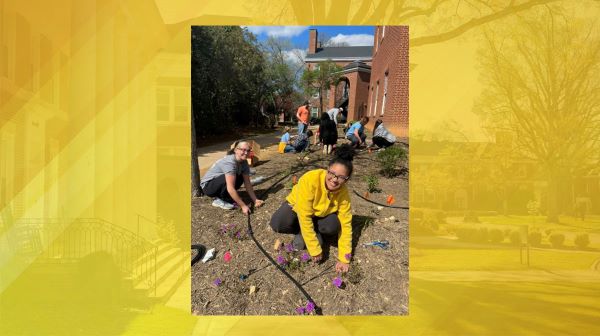
Pfeiffer Continues to Right the Ecosystem
Dr. Carrie DeJaco, an Associate Professor of Biology and Environmental Science at Pfeiffer University, believes that her students can do their part to benefit the ecosystem. So this semester, she’s been teaching them how to do just that via their creation of a native pollinator garden between the annex of the Harris Science Building and the Stokes Student Center.
The project, part of a course called Reconciliation Ecology, is one of the latest efforts by DeJaco and her students to draw attention to the necessity of incorporating native plants into the landscaping by doing so on Pfeiffer’s Misenheimer campus. It’s also complementing efforts by Pfeiffer students and others to remove invasive plants and replace them with native ones; for example, on the second Saturday of each month since October, volunteers from the Carolina Thread Trail have been removing invasive plants from the Falcon Trail, one of the great attractions of the Misenheimer campus.
The native pollinator garden project is the subject of a forthcoming interview that DeJaco granted to “The Backyard Naturalists,” a podcast. It contains a rain garden at one end that’s been described as “a landscaped, shallow depression planted with native plants that captures, temporarily holds, and filters stormwater back into the ground.”
The garden contains several native plants, including yarrow, leucothoe, columbine, milkweed, crossvine, Christmas fern, verbena, and blue violet. “It is in line with the goal of reconciliation ecology, which is to mitigate or reconcile human-dominated spaces by providing an opportunity for natural ecosystem processes to occur,” DeJaco said. “The students are really excited about this project. They’re beautifying an area of campus many students walk by that was previously just a strip of dirt. And they’re showing what can be done to address the problem of invasive plants.”
Those problems are becoming increasingly prevalent. Invasive plants (usually plant species that are native to Europe or Asia) often originate as landscaping items sold in garden centers of big box stores. In many instances, invasive plants escape the confines of a private landscaping project: birds eat the fruit that these plants produce, then they fly off into forests and excrete seeds that germinate into invasive plants.
Once in the wild, invasive plants alter the soil chemistry in a way that prevents native plants from being able to use the nutrients that they need. The population of bugs decreases because there is less of the right plant food for them to eat. The species whose diets are dependent upon the bugs, including birds, lizards, and frogs, are then affected by the altered bug population.
Students involved in the garden project took many steps to make it a reality. They studied the lay of the land, soil characteristics, and light parameters. They then researched different kinds of native plants to see which ones would do well in the garden’s area.
After selecting which native plants they wanted, they put together a design for the garden and presented it to Joe Bahr, Pfeiffer’s Director of Facilities Operations, for his review. They then tweaked the design based on Bahr’s feedback.
DeJaco said that there are enough spaces on Pfeiffer’s campus to install new native gardens for the next 20 years.
“It would be huge if Pfeiffer could advertise that its campus was completely landscaped with native plants,” she said. “It would be a very big thing in terms of showing a commitment to sustainability and trying to maintain biodiversity and ecosystem function.”